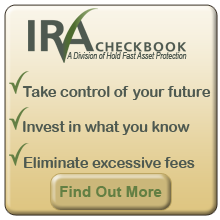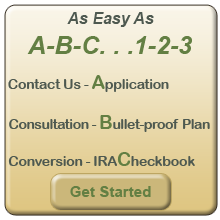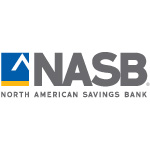 |
  |
Self-Direct Your IRA or 401K Funds to Buy Real Estate!
Your retirement is your future! Invest in what you know using a Real Estate IRA or Real Estate 401k
Access your IRA or 401(K) funds at your local bank with an IRA checkbook or 401K checkbook Plan. An IRA checkbook or 401K checkbook Plan affords you complete control of your retirement savings. Yes, you can use either of these plans to purchase investment real estate. If desired, you can even obtain a loan to purchase the investment property using retirement funds as the down payment. This creates diversification without tying up all of your retirement funds.
The IRS requires a non-recourse loan for all real estate purchases that use funds from the IRAcheckbook or 401Kcheckbook Plan as the down payment. North American Savings Bank specializes in non-recourse loans and so does First Western Federal Savings Bank.
Many people think that they cannot use their IRA or 401(K) to purchase investment real estate. The truth is, YOU CAN, and with many benefits. One of the main benefits of a real estate IRA is to diversify your portfolio. By purchasing rental property; multi-family apartments; a commercial building; land or even a rental property on the beach, you can tap into your IRA or 401(K) money without paying a penalty and invest in what you know. Where do you see the opportunity? By leveraging part of your retirement, real gains are once again possible. Be your own wealth advocate!
 What all hard-working taxpayers should know.
What all hard-working taxpayers should know.
Using self-directed IRA or 401(K) funds to purchase income-generating real estate is a profitable strategy an ever-growing number of savvy investors are experiencing, especially given the current market conditions. With an IRA checkbook or 401K checkbook Plan, you can buy rental property as an investment – just as you would buy stock market securities. This means our customers can use their retirement funds to buy real estate without incurring early distribution taxes or penalties, and they can realize the rental payments as tax-deferred income within their IRA or 401(K); in the case of Roth IRA funds, tax-free growth. That’s right! Rent does not show up on the tax return. There’s also no Schedule E because the rent is seen as a return on investment to the IRA or 401(K), not income. The same is true with capital gains. Profits upon sale are seen as a return on investment to the IRA or 401(K) and there is no Schedule E involved. All that is required is a one-time report of value for the self-directed IRA at year-end. In the case of a self-directed 401(K), there’s no requirement for a year-end report if the value is less than $250,000. The power of this is evident!
Who’s promoting self-directed investment in real estate?
 Buying real estate in an IRA or 401(K) is not new. Commonly called a Self Directed IRA or 401(K), it has been an option since the passing of the Employee Retirement Income Security Act (ERISA) in 1974.
Buying real estate in an IRA or 401(K) is not new. Commonly called a Self Directed IRA or 401(K), it has been an option since the passing of the Employee Retirement Income Security Act (ERISA) in 1974.
However, you’re not alone if you are one of many investors who are not familiar with the self-directed concept. It isn’t promoted or supported by brokerage firms who would rather sell you stocks, mutual funds, and bonds over and over again for multiple or ongoing investment fees instead of the one-time fee for buying real property.
Using your retirement funds in conjunction with a loan.
 Using a non-recourse loan in conjunction with your IRA checkbook or 401K checkbook Plan can create a powerful wealth-building tool. It’s very important when you set up a self-directed IRA or 401(K) with a non-recourse loan that you work with an experienced and reputable facilitator, real estate lender, and tax professional. We believe our team and affiliates are the best in the business. In fact, our company, IRAcheckbook, is one of the top five facilitators recommended by NASB, North American Savings Bank.
Using a non-recourse loan in conjunction with your IRA checkbook or 401K checkbook Plan can create a powerful wealth-building tool. It’s very important when you set up a self-directed IRA or 401(K) with a non-recourse loan that you work with an experienced and reputable facilitator, real estate lender, and tax professional. We believe our team and affiliates are the best in the business. In fact, our company, IRAcheckbook, is one of the top five facilitators recommended by NASB, North American Savings Bank.
There are a limited number of banks that will provide non-recourse loans, and it’s worth your while to seek them out. Be prepared for the possibility of some confusion unless you’re dealing with a bank that specializes in non-recourse lending or a commercial lender. Many banks that have provided non-recourse loans in the past have usually done so for multi-unit or commercial purchases, not single-family homes bought by self-directed IRA or 401K funds. The right tax and real estate professionals can help you get through this confusion.
With the right counsel and professional direction, you can open the door to many more investment opportunities for your IRA or 401(K). Real estate investments you once thought were “out of reach” can now be part of your portfolio!
 Here are some examples:
Here are some examples:
(1) If you decide to purchase a retirement home and you’re years away from retiring, use your IRA or Real Estate 401k to purchase the property and rent it out in the meantime. The income you receive in rent is tax deferred until you start to take withdrawals, so you can put it away until you do retire. When you’re ready, you simply direct your IRA or 401k to turn it over to you as a distribution at the current market value.
 (2) If you decide to purchase a residential rental property for $100,000 and the rents are $1,000 per month, use your IRAcheckbook or 401Kcheckbook Plan to purchase the property. Once owned, deposit the rent into your IRAcheckbook or 401Kcheckbook account and that’s it; no fancy accounting, no Schedule E, just a one-time annual report for the IRA, and no requirement for the 401(K) if the value is under $250K. The rents are viewed as a return on investment to the IRA/401(K) so they don’t show up as taxable income on the tax return. Let’s say you find a better deal for a rental, so you sell. Again, there is no capital gain for the IRA or 401(K); all profit is viewed as a return on investment under the umbrella of the IRA/401(K) provisions. You can purchase multiple properties this way and the same is true. Everything is viewed as assets of the IRA or 401(K)!
(2) If you decide to purchase a residential rental property for $100,000 and the rents are $1,000 per month, use your IRAcheckbook or 401Kcheckbook Plan to purchase the property. Once owned, deposit the rent into your IRAcheckbook or 401Kcheckbook account and that’s it; no fancy accounting, no Schedule E, just a one-time annual report for the IRA, and no requirement for the 401(K) if the value is under $250K. The rents are viewed as a return on investment to the IRA/401(K) so they don’t show up as taxable income on the tax return. Let’s say you find a better deal for a rental, so you sell. Again, there is no capital gain for the IRA or 401(K); all profit is viewed as a return on investment under the umbrella of the IRA/401(K) provisions. You can purchase multiple properties this way and the same is true. Everything is viewed as assets of the IRA or 401(K)!
 (3) If you decide to purchase a net-leased commercial property for $2,500,000 and the net operating income is $250,000 per year, use your IRA checkbook or 401K checkbook Plan to purchase the property. Once owned, deposit the rent into your IRAcheckbook or 401Kcheckbook account and that’s it; no fancy accounting, no Schedule E. The rents are viewed as a return on investment to the IRA or 401(K) so they don’t show up as taxable income on the tax return.
(3) If you decide to purchase a net-leased commercial property for $2,500,000 and the net operating income is $250,000 per year, use your IRA checkbook or 401K checkbook Plan to purchase the property. Once owned, deposit the rent into your IRAcheckbook or 401Kcheckbook account and that’s it; no fancy accounting, no Schedule E. The rents are viewed as a return on investment to the IRA or 401(K) so they don’t show up as taxable income on the tax return.
 (4) If you decide to purchase land for $250,000 and are land-banking for several years, use your IRA checkbook or 401K checkbook Plan to purchase the lot or tract. Once sold, all profit is viewed as a return on investment under the umbrella of the IRA or 401(K) provisions. You can purchase multiple properties this way and the same is true. Everything is viewed as assets of the IRA! That’s it; no fancy accounting, no Schedule E. Some restrictions for the examples above:
(4) If you decide to purchase land for $250,000 and are land-banking for several years, use your IRA checkbook or 401K checkbook Plan to purchase the lot or tract. Once sold, all profit is viewed as a return on investment under the umbrella of the IRA or 401(K) provisions. You can purchase multiple properties this way and the same is true. Everything is viewed as assets of the IRA! That’s it; no fancy accounting, no Schedule E. Some restrictions for the examples above:
- Until distribution at retirement, the house or property has to stay in the IRA LLC or 401K Trust.
- You can manage the property; you just can’t live in it, or use it.
- You may lease it to others; some restrictions apply to family members.
- Any profit you receive from rent must be returned to the IRAcheckbook or 401Kcheckbook account.
- Any gains from a sale must be returned to the IRAcheckbook or 401Kcheckbook account.
Capital gains are treated as a return on investment as well. Again, no Schedule E. In fact, rents and/or gains are not reported on the tax return.
What other types of Real Estate can I buy?
- Single-family homes
- Multi-family complexes
- Net-leased Commercial
- Retail
- Office
- Industrial / Warehouse
- Land
- Beach houses
- Vacation Rentals
- Townhomes/Condos
Types of Retirement Plans eligible for Self-Directed IRA/401(K) Accounts:
- Traditional IRA / 401K
- SEP IRA
- Roth IRA / 401K
- Simple IRA
By purchasing real estate in your retirement plan, you are not changing what your retirement funds do (building tax-free or tax-deferred value for use at some future date); you are simply changing the type of investment in your retirement account (from stocks, bonds and mutual funds to real estate) in order to reap the benefits of appreciation and rental income under the umbrella of the IRA/401(K) tax benefits.




